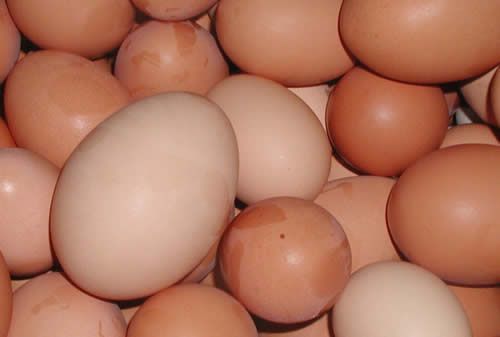
As many as half a million hens in the United Kingdom are still being housed in conventional laying cages - in breach of a European Union ban.
An EU regulation that came into force on January 1 this year outlaws old battery cages and insists on the use of enriched colony, barn or free range units for the union’s egg producers. The UK egg industry had been warning that up to a third of hens in other EU states would still be housed in conventional cages when the ban came into force and it has been pressing for Government action to protect British farmers from imports of illegally produced eggs The revelation that some UK hens are still in illegal units is clearly an embarrassment for the industry in this country.
The British Egg Industry Council (BEIC) expressed anger at the news. Chairman Andrew Parker said, "We are disgusted that these few producers are still using banned barren battery cages. It is illegal and is grossly unfair on the vast majority of UK producers who have invested £400 million in ensuring that they meet the new standards on time. We urge the enforcement authorities to take immediate action against any non-compliant producer."
Both the UK egg industry and the UK Government have been critical of other states for failing to ensure that their egg producers would be ready for the introduction of the Welfare of Laying Hens directive - the regulation that bans the use of conventional cages. They have also been critical of the European Union for failing to take action early enough to prevent the ban being flouted.
Figures now show that 500,000 UK hens are still in conventional cages. The hens are housed on about 30 farms. The Government said the percentage of UK hens in breach of the rules was low and it was taking action against them.
A spokesman for the Department of Environment, Food and Rural Affairs (Defra) said, "The level of non-compliance in the UK is very low and latest figures show that it represents just one per cent of the total UK flock. By 1 February we expect that these producers will have stopped using these battery cages or we will have issued legal notices and referred the producers to the local council who will consider prosecution. It is disappointing that a small minority of egg producers have not yet made the necessary changes when the rest of the industry has spent £400 million to improve welfare and meet these standards."
The BEIC said that British Lion egg producers, who represented 85 per cent of UK egg production, were appalled that some UK egg producers were still keeping hens in conventional battery cages despite the ban.
It said that all British Lion cage flocks were compliant with the Welfare of Laying Hens directive and all British Lion cage eggs now came from hens kept in more animal welfare-friendly colony cages.
The BEIC said that about 50 million hens, producing 40 million eggs a day, were known to still be in banned battery cages in several other EU member states, including Italy, Spain and Poland.
The BEIC has begun judicial review proceedings against Defra because of the Government’s failure to ban imported eggs and egg products produced in illegal cages. The BEIC says its legal advice is that the Government has incorrectly interpreted the law and it believes that the Government must not condone the importation of illegal battery cage eggs and egg products into the UK.
On announcing the legal action, Andrew Parker said, "British egg producers have invested heavily to meet their legal obligations and improve animal welfare. We now need our Government to support them by preventing unfair competition from producers in other countries who have not complied with the ban.
"EU member states have had more than 12 years to get their houses in order and comply with the new legislation, so there are no excuses.
"We’re asking the Government to conduct proper checks of imported eggs, egg products and products containing eggs entering UK ports, egg packing stations, processing plants, importers and wholesalers. Otherwise, UK consumers could be eating eggs from illegal battery hens, and British egg producers will be seriously undermined, with the possible loss of thousands of jobs."
Although the Government has said it will conduct checks of shell egg imports, it does not plan to check imported egg products or products containing eggs, meaning that illegal eggs can be used by UK food manufacturers and caterers in products such as quiche, egg mayonnaise and Scotch eggs, or be contained in finished foods containing eggs imported from other EU countries
"This is ridiculous," said Andrew Parker. "All that is required is the production of proper supporting documentation with all eggs and egg related products entering the country, which is already a legal requirement on distributors. This is standard traceability procedure operated throughout the food industry both here in the UK and in the EU so it should be a straightforward process for the Government to do the right thing, both ethically and legally."
The BEIC has launched a new website - www.legaleggs.com - and is calling for food companies and the public to sign its pledge to support British egg producers and help keep illegal eggs out of the UK.
